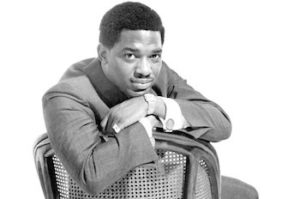
Edwin Starr
*Edwin Starr was born on this date in 1942. He was a Black singer, musician, and entertainer.
Born Charles Hatcher in Nashville, Tennessee, his cousin was a deep soul singer and songwriter, Roger Hatcher. He moved from Nashville as a child to Cleveland, where, as a teen, he started his vocal group, the Future Tones. In 1960, he entered the Armed forces, entertaining troops around Europe. 1962, after completing military service, he moved to Detroit, Michigan.
By the middle of the decade, he recorded on the RicTic label under Ed Wingate. He was recruited into the Bill Doggett combo, where Doggett's manager, Don Briggs, said that he would be a star one day. That's when Edwin recruited Starr as his last name and took his middle name, Edwin, for his first name. Starr first made his music reputation with "Agent Double-O-Soul,” which hit the R&B Top Ten later in 1965 and just missed the pop Top 20. Starr capitalized on the song's novelty appeal by appearing on-stage in a spy costume complete with a toy gun, but proved he was no one-trick pony by returning to the Top Ten a year later with "Stop Her on Sight (S.O.S.)."
Then his contract was transferred to Motown Records, and he instantly became one of the roughest, toughest vocalists on the crossover-friendly label, with his debt to James Brown and the Stax soul shouters. Contract negotiations took time, but Starr rebounded with his biggest hit yet in 1969's "25 Miles," which reached the Top Ten on both the pop and R&B charts. The follow-up, "I'm Still a Struggling Man," wasn't as successful, and Starr was a forgotten man for several months. He returned to the studio with producer Norman Whitfield, who'd been reinventing the Temptations as a psychedelic soul group.
Whitfield had co-written a raucous anti-war protest song, "War," for the Temps' Psychedelic Shack LP. Whitfield re-did "War" with Starr, resulting in perhaps the most provocative song Motown ever released. It zoomed to the top of the pop charts in 1970, and its chorus, driven by Starr's throaty delivery, remains a catchphrase even today. The follow-up single, "Stop the War Now," was copied but made the R&B Top Five anyway, and Starr went on to land another significant hit with "Funky Music Sho' Nuff Turns Me On." In 1974, he did the soundtrack to the Blaxploitation film Hell Up in Harlem, a sequel to the James Brown-scored Black Caesar (Brown had initially been scheduled to do the follow-up). He charted again in 1975 with "Pain" and left the label with "Who's Right or Wrong." He found a new home in the 20th Century in 1978.
Here, he briefly reinvented himself as a disco singer, achieving this with 1979's "Contact" and "H.A.P.P.Y. Radio." Starr moved to the U.K. during the '80s, recording a Marvin Gaye tribute album and a handful of singles until 1986. His Ferry Aid charity project participation led to a deal with Stock, Aitken & Waterman's production team. Still, he didn't take to their high-tech dance-pop style and moved to Ian Levine's Motown revival label Motorcity until 1991. He worked on dance remakes of his past hits by Utah Saints ("Funky Music") and Three Amigos ("25 Miles").
Edwin Starr died on April 2nd, 2003, at his home near the central city of Nottingham, England.